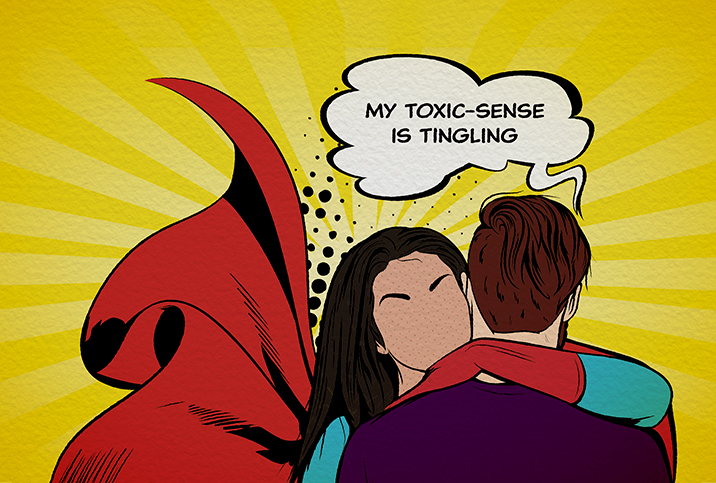Are You in a 'Delusionship'?

It is love at first swipe. Attractive. Employed. Tall with dreamy eyes that seem to look only at you. And they live in your neighborhood. It's a match!
Your heart races faster as you scroll through their linked Instagram, falling deeper in love the more you see. They go on road trips, are great with dogs, had an on-point Uncle Jesse from "Full House" Halloween costume last year and tore up the dance floor to 1980s tunes at their brother's wedding.
You're already picturing the two of you on a road trip across the country with your golden retriever, Comet, stopping at dive bars along the way to show off your dance moves. You'll have a perfectly choreographed routine to your favorite Queen song "Don't Stop Me Now," which you'll throw on the jukebox anywhere you go. Which, of course, is nothing less than a rehearsal for the night you'll dance to it at your wedding.
You have your whole future planned out. And you'll be ready to start on that path. Just as soon as they message you back.
If this sounds all too familiar, you might already be in a "delusionship."
What is a delusionship?
"A delusionship is the type of relationship where one person was delusional the whole time and the relationship never really existed in the first place. It was all in their mind and delusions," according to the Urban Dictionary.
"It's an idealized infatuation you have with someone whom you are not in a relationship with," said Kristin Davin, Psy.D., a clinical psychologist in Jersey City, New Jersey. "The 'delusion' part is due to you creating a fantasy––in your mind––of what it would be like to be with this person, despite not knowing the real, authentic person."
The relationship you have created is all in your mind.
Another sign you might be in a delusionship is if you find yourself romanticizing about this person and what your life with them would look like even before you've actually spoken to them.
"Maybe they gave you a bit of attention, but you take that to another level and the lines are blurred between what you have imagined in your mind and reality," Davin said. "You might become slightly delusional about this person, just based on a picture or a brief exchange. The relationship you have created is all in your mind. It's imaginary. But you believe with conviction that it's real."
Dating apps and social media breed delusionships
In a world of social media and dating apps, delusionships are very common.
"Social media and dating apps make it that much easier to lead people on—even unintentionally," said Shawn Li, a pre-licensed relational psychotherapist and owner of Therapy With Shawn in New York City.
"People are constantly getting strung along or fed crumbs on dating apps," said Jeni Simas, a certified relationship, sex and intimacy coach in Baltimore. "It's easy to miss the signs that the person on the other side of the app might not have the truest or kindest of intentions, so they accept the slow drip of affection and read way into it. They see love where there is only mild interest."
Dating apps and social media have made delusionships more prevalent because of access.
"The dating apps don't really tell much about a person," Davin said. "A person can put whatever they want on an app or post something on social media that may or may not be true. People take this information—pictures, posts and so on—as truth and then create something out of that. Even though most people recognize that social media and apps are not honest."
How does a delusionship differ from a crush?
"A healthy crush acknowledges the reality that a relationship between you and the other person hasn't been established yet. A delusionship comes from the word 'delusion.' In mental health, the definition of delusion is a fixed and rigid belief that doesn't change, even in light of conflicting evidence," Li explained.
A delusionship is a magnified crush, according to Davin. In it, the person fantasizes about another person and what their life could look like. A crush, on the other hand, is a bit more innocent, flirty and fun.
There's another big difference between delusionships and crushes. A crush is usually on someone you don't know very well, such as a stranger, acquaintance or celebrity. You might fantasize about this person but you accept it's a fantasy.
"Crushes are generally innocent and don't amount to more unless you move them forward," Simas said. "While in a delusionship, you take the details you have about this person, make up the details you don't know, and create an alternative reality where you and this person are in an imaginary relationship, which you might believe is real."
Signs your delusionship is unhealthy
A delusionship can quickly become unhealthy when it starts to become an obsession and you begin to lose grip on reality.
"Delusionships are not healthy because they indicate it's one side driving the assumption about a relationship. The paradox is that a healthy relationship is not one-sided," Li said. "Being in a delusionship can hurt your chances for genuine, authentic connections that add goodness to your life.
"If you're not being treated with respect and emotionally intelligent communication, it's taking up energy that could otherwise be used for so many better things."
People should not let emotions cloud their judgment.
"If you find yourself in a delusionship, it's important to take a step back and reassess the situation," said Martha Tara Lee, D.H.S., a relationship counselor and clinical sexologist with Eros Coaching in Singapore. "Ask yourself if this person is truly right for you, or if you're just caught up in the fantasy of being with them."
It might be time to speak with an unbiased licensed mental health professional if you find yourself constantly stuck in a pattern of being in one delusionship or situationship after another.
"If you have a history of crash-and-burn, short-lived romances––and that's not what you want––it may be a sign of deeper attachment wounds that need to be addressed," Li said.
How to end your delusionship
"You cannot pretend your way into a lasting and meaningful relationship," Simas noted. "It is not possible. You have the power to walk away, admit what is real and what is not and simply end it."
If you're having a difficult time getting out of your delusionship or find you've become so attached to the idea of this person that you feel you cannot function without obsessing over them, Simas advised thinking about getting professional help.
"I highly recommend a mental wellness check-in," she said. "Even if you go for just one session to get some tools to help ground you in reality, that is far better than ignoring the warning signs of a serious issue."


















